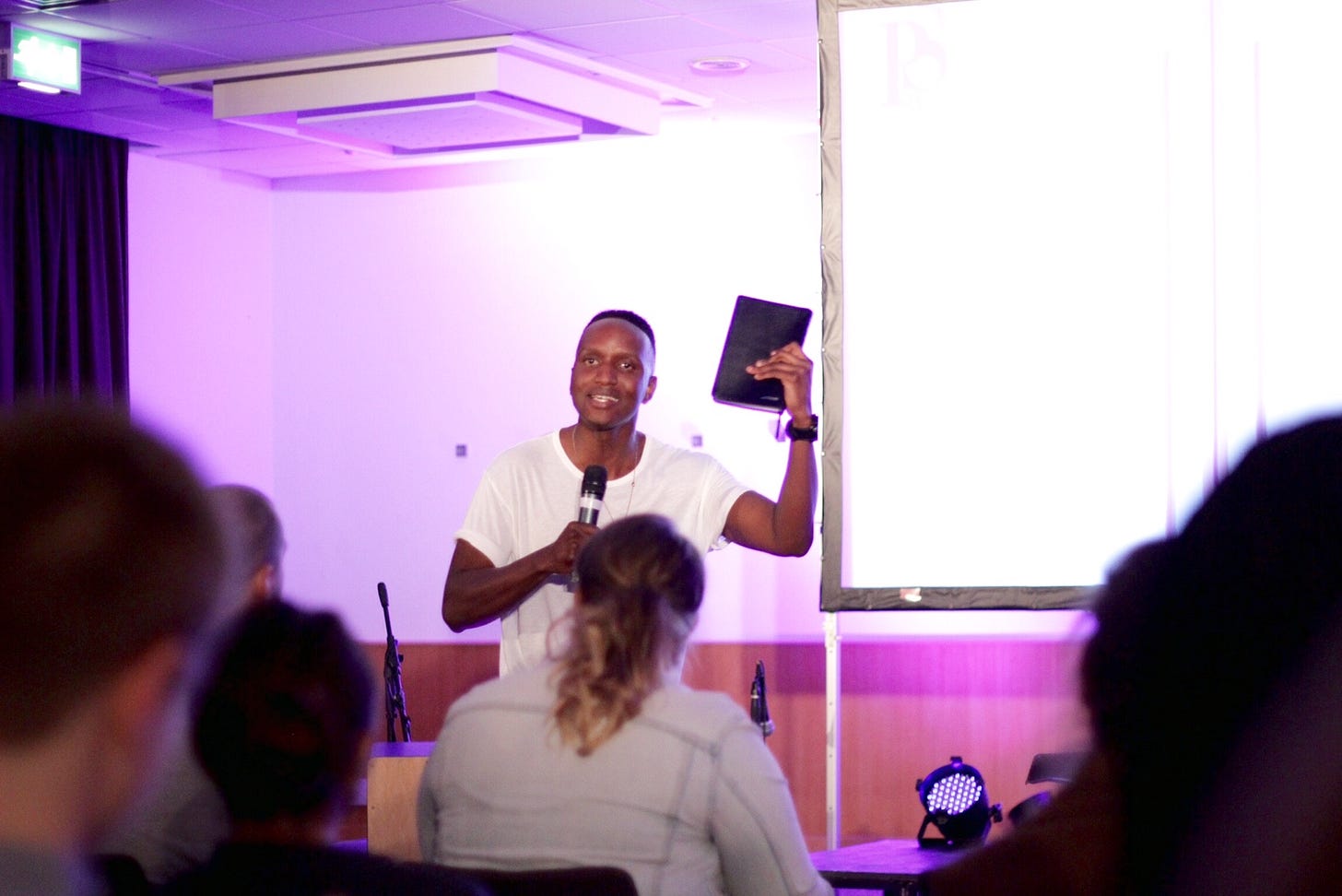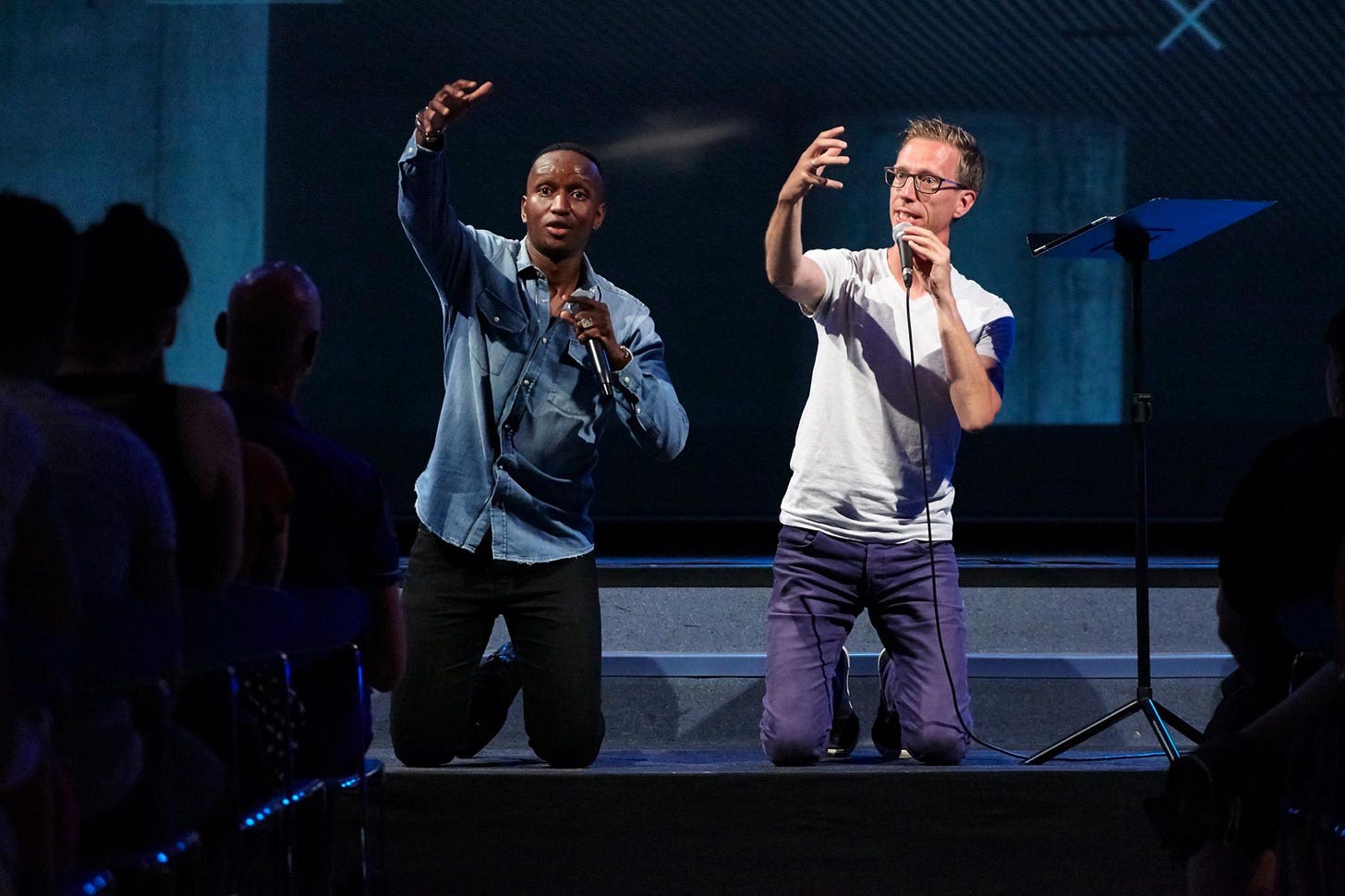BONA, derived from the Zulu greeting to a multitude of people, 'Sanibona' - directly translated as 'we see you' - forms the premise of this publication, by Tebo Mpanza
If “We see you” forms the premise of this Substack, then so does my preaching.
Last Sunday I preached the marathon—four times. I’d just finished preaching the 5pm, wired on adrenaline and zero sleep, when it dawned on me that the 7pm was still to come. Our son, Maximilian, had kept us up all night, and it had been months since I’d preached, but the muscle memory is still there—somewhere. They say preaching one sermon is equivalent to a full day’s work. I don’t know who ‘they’ are, but after four, I still feel like I’ve been hit by a bus by the following Thursday.
One of the young guys, Harrison, came up to me and asked, “Tebo, how do you do it? How do you preach like that?” I thought, “Preach like what?” But deep down, I knew what he was asking. I didn’t have time to give him the full answer—I was on my way to grab a lemon and ginger tea (Pentecostal friends, don’t worry about it—we get our own drinks in our circle, in the foyer). So I gave him the short answer: something about my 10,000 hours. Which is true. I was preaching most Sundays in my 20s—youth events, young adult events, camps, conferences, cross-cultural spaces. If I’d had time to share a flat white with Harrison, I would’ve told him more.
I would’ve told him that my preaching doesn’t come from confidence at all—it comes from scar tissue. It comes from having trusted people deeply and been let down. From the healing I’ve had to walk through. From the forgiveness I’ve had to extend when apologies never came. From difficult conversations. From people walking away. From holding responsibility and leading in contexts where the return was minimal—at least in the immediate. From delayed gratification. From, at times, no gratification at all. From moments where I had to return to places that broke my heart—and still serve.
I’d tell him that my preaching comes from walking through vocational disappointment. Through closed doors. Through dreams that didn’t unfold the way I imagined they would in my early 20s. There were times I felt like I didn’t fit. Twice in my 20s and 30s I’ve worked in vocational ministry, and both times—for different reasons—it didn’t work out. Pastor Malcolm Baxter used to talk about how sometimes we don’t fit boxes. I think I’m one of those people. So now, when I preach, I try to see those who can’t be seen. Speak for those who struggle to speak for themselves. The ones who’ve been overlooked, misunderstood, unseen. Because I know what that feels like. The preachers and messages that I connect the most with are the ones that don’t just have great theory, but the ones that also draw from a place that’s been tested.
Becky (my wife) said something to me on the drive back to London on Monday night that hit hard. She said, “The thing about you, Tebo, is that not only do you let things go—but you really forget.” And she’s right. I think I’ve been graced to forget. My mom always says I don’t remember anything—or anyone—when she tries to remind me about some friend of hers that I met once when I was four. That’s a problem. But maybe it’s also a gift. It’s not that we don’t get crushed, it’s what the crushing produces in us.
A friend of mine recently moved to London to plant a church. As he shared his plans over dinner, I felt encouraged. Hopeful. There’s still a generation packing up their lives to follow a God-dream. And for a few days after, I wondered—what if we’d had the right set-up too? What if our family was looked after? What could we have done, where could we have gone?
After the 11:30am, another brother asked if I worked part-time at a church. I said, “No, I run a brand agency.” He couldn’t quite get his head around that, and kept clarifying. I guess it’s not that straightforward—and there is a story there. It made me realise I probably need to change my narrative. I haven’t given up on ministry. It just looks different now.
If I had more time with Harrison, I’d tell him: what you’re asking about isn’t the hours, the stories, or the style—it’s the well. You’re asking how deep that well runs. I’d tell him, “Buddy, you don’t want to preach.” But I wouldn’t mean it. His generation needs him to count the cost and step up. I just know what it takes. I’d say to the young and new preachers—preach from the well. Style, cadence, pitch, vibe—you can learn all of that. But it takes time to find your voice.
The problem I’m seeing now is that there aren’t many fathers. There are plenty of talented, sharp, gifted, operational, and managerial leaders—but few fathers. And I worry about what that means, especially for the young guys and girls in five or ten years’ time. I get it, though. It’s hard work. Honestly, I think a lot of the men who were meant to father are bruised themselves. And it’s easier to hold people at arm’s length than it is to face that weight—because the pressures we carry as men are real. It’s easier to walk out of a back room just before the service starts, and be one of the first to leave when it finishes, than it is to work the room. Because now, it’s just a job. You’re clocking time. I get it.
What did I preach last Sunday?
I preached from Mark 10:35–45. A message called The Upside-Down Crown—about greatness in the Kingdom. How Jesus confronts ambition with humility. How he redefines success not by who serves you, but by who you serve. I preached about pride, servanthood, leadership wounds, and the quiet, unglamorous, necessary work of laying down your life.
Here’s the link to the full message if you want to watch it.












Good stuff man. Powerful to hear the journey, felt honoured to have been a witness to some of it’s externalities over the years from affaaarr. Bless you and your fam 🙏🏻
Excellent